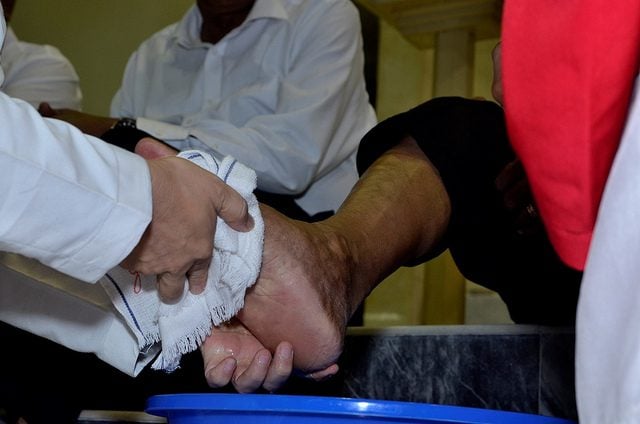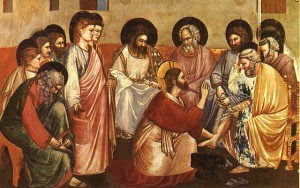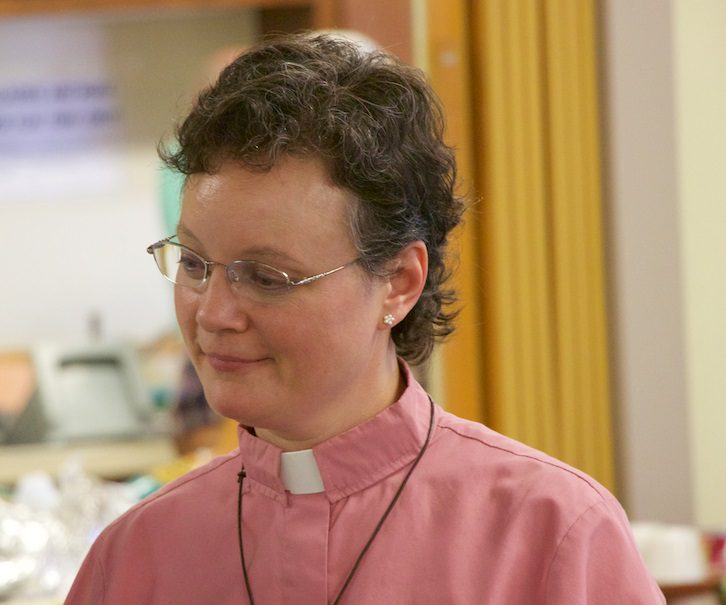I remember as a kid the first time I went to a Maundy Thursday service. The first thing I noticed as I looked at the bulletin is that things in the order of service were out of order. And why is there a basin and pitcher on the altar? And why is there no benediction? And why are they taking away all the things from the altar at the end of the service? Add to that my child-like confusion about the name of the service before I understood that Maundy means “mandatum” or command, referring to Christ’s command for us to love, serve and receive the bread and wine. As a child it just seemed like we were confusing the names of the day. Is it Monday or Thursday? How can it be both? Everything is out of order. This is so confusing!
I would imagine Peter and the disciples felt this same kind of disorientation when Jesus went to each of them to wash their feet.

For them to have their teacher insist on washing their feet was completely out of order. In our culture and time, foot washing is not common. But in Jesus’ day, the people often went barefoot or with open sandals and their feet would get dirty from the dusty, grimy roads of the city and countryside. It was a practice of respect to wash one’s feet when entering a house, so as not to bring in the dirt from outside. In wealthier houses the servants washed the feet of the guests. Washing a person’s feet was a lowly, thankless task.
In fact when you think about it, any kind of washing is still a lowly, thankless task that most of us avoid if we can.
If we have enough money we hire someone else to do our washing for us. We hire others (always from an economic rung lower than us, usually women, sometimes undocumented) to wash our clothes, scrub our toilets, and vacuum our floors. When you go out to eat, the person in the restaurant with the least prestigious job is the dishwasher. When you stay at a hotel, the room is cleaned by a maid whom you rarely see.
That’s another interesting thing about those who wash. It’s important that they are as unobtrusive as possible, and best if they’re never seen at all.
The housemaid comes after the family has left for work and school. The dishwasher never comes out of the kitchen. The maid comes after you’ve checked out of your hotel room. Even the one who cleans your church is probably rarely seen at the task.
That’s another thing about those who wash. They’re easy to forget.
You probably don’t know much about the person who cleans your hotel room. The dishwasher in the restaurant doesn’t come out like the waitress and say, “Hi, my name is Stuart and I’ll be your dishwasher this evening.” These are the people who we expect to do their job without being seen or recognized, and without having to tip them for the work they do.
So imagine the disciples’ embarrassment when their teacher donned a simple loincloth – the uniform of a servant – and stooped at their feet to wash them.
This was the lowest he could go. Imagine a CEO at a corporation going to each of her employee’s offices and emptying their garbage for them. That would be unheard of. We’d think she was nuts.
That’s just what the disciples thought about Jesus. What are you doing? That’s not your job. If anything, we should be washing your feet, not the other way around.
Think of the implications of what Jesus was doing.
If someone of his social status – a rabbi – started doing common foot washing, what did that mean for everyone else? Those who shared his social status would be brought down a notch. And for those who did this lowly washing all their lives, their status was lifted by virtue of Jesus performing the task.
Jesus got everything out of order. He confused the status quo. It made people uncomfortable because Jesus leveled the playing field.

And then to make the situation even more shocking, Jesus told them that this is what they should be doing for each other all the time. This act of foot washing was not just for the upper room. According to Jesus, this is what is supposed to happen in the rest of society as well. Can you imagine the implications?
You see, Jesus’s reversal of things shakes us up, disorients us, like he did when riding into Jerusalem on that silly, lowly donkey. And we don’t like that, because it means that things have changed. We rarely like change, especially if we’re not the ones in control of it. But God shakes things up for a reason. Because when you shake things up, it creates an opening for something new.
What is the new thing that is being created?
Listen to the words of Jesus after he completes the foot washing:
“Little children, I am with you only a little longer. You will look for me, and as I said to the Jews, so now I say to you, ‘Where I am going, you cannot come.’ I give you a new commandment, that you love one another. Just as I have loved you, you also should love one another. By this everyone will know that you are my disciples, if you have love for one another.”
Now we begin to see what Jesus had in mind. This kind of love is fine to talk about, but to have it done to you in such a surprising, tangible way—like footwashing—gives it a whole new meaning.
Have you ever had your feet washed?
I mean literally—can you think of a time when you had your feet washed by another? Perhaps you’ve treated yourself to something like that at a spa where you pay $50 for such a service. But I’m talking about something simple like what Jesus did for his disciples. For many of us, the last time we had someone washing our feet on a regular basis was when we were children. Probably it was your mother who washed your feet for you most of the time. You were probably no more than a few years old, but you may have some memory of what that was like.
I remember being in the bathtub with my floating toys and the bubbles.
My mom would let me play in the water for a little while, then she would come in and scrub me down. She’d start with my hair and face, then my shoulders and belly, my legs and my feet. They were always last. And she’d usually tickle them as she washed them. I can still remember giggling as she lifted my foot out of the water and washed between my toes with the washcloth. Then I would step out of the tub and she’d wrap a towel around me and hug me and I felt so warm and clean. It was one of the best feelings in the world.
You can see how washing feet can be a very intimate experience. This was something else the disciples probably felt as Jesus poured water over their feet and then dried them with the towel that was wrapped around him. It was a moment of tenderness and warmth that he shared with them. An act of caring that went beyond anything they had ever experienced with him before. They did not realize it then, but what they were experiencing was the kind of love that would lead Jesus to another act of caring they had never known before.
It’s hard to imagine how strong that love is unless you’ve experienced it.
And often, it’s not until things are out of order that you are able to see it, maybe even for the first time.
That happened a few years ago for me at a Maundy Thursday service I attended as an adult with my mom. Hardly anybody was participating in the foot washing because it feels strange and embarrassing for people. But my mom and I decided we would be adventurous and go up to the basin and pitcher.
The pastors went first. They washed each other’s feet and dried them with the towels. Then two other people in front of us washed as the congregation sang hymns. Then it was our turn. I took off my shoes and my mom knelt beside the basin at my feet. I watched her pour the warm water over my toes and ankles, first one foot and then the other. And I remembered how she used to wash my feet as a child. I was a little embarrassed, I have to admit. Because things were out of order. Yet there she was, wrapping the clean towel around my feet, tenderly wiping them dry. And I was surprised how refreshing I felt from my feet on up.
Then it was my turn to wash her feet. And this really struck me because, again, things were out of order. I had never done this before.
I had never washed my mother’s feet.
Washing was always her job. She was the maid, the dishwasher, the one who did the lowly thankless tasks that were so easy for me to ignore and forget all those years. Yet here I was, holding her feet in my hands, pouring warm water over them. Then I took a clean towel and wiped each foot dry. It was an experience I’ll never forget.
As we both stood up, we embraced each other, just like we did when I was a child. Because of this rare moment when things were out of order, we were able to participate in a moment of tenderness and intimacy we had never experienced before. And in that moment, the love of God became real for me in a whole new way.
We will all experience times when things are shaken up, disorienting us, creating confusion and embarrassment. In fact, you may find that happening at the Maundy Thursday service you attend. Or during the Good Friday service, or during the Saturday Vigil. Or maybe sometime in the future when you least expect it. When that disorientation happens, let yourself experience the strangeness of it. Be aware of how you feel when you see the altar being stripped, when you listen to the reading of the story of Jesus’ crucifixion in the darkness, when you see the candle glowing. Follow this through all the way through Easter morning. God may be creating something new within you so that you may experience God’s love in a way you never have before.
We who receive God’s love in Jesus are called to love each other, to be servants to each other, just as Jesus became our servant. And it is in Holy Communion we share that we can participate most intimately in Christ’s love. Communion is like that warm embrace after the washing.
It is in these moments of our Christian lives—in washing, serving, and sharing the Eucharist—that we experience God’s love.

Leah D. Schade is the Assistant Professor of Preaching and Worship at Lexington Theological Seminary (Kentucky) and author of the book Creation-Crisis Preaching: Ecology, Theology, and the Pulpit (Chalice Press, 2015).
You can follow Leah on Twitter at @LeahSchade, and on Facebook at https://www.facebook.com/LeahDSchade/.
See also:
Competing Fractals: Good Friday and Saturday Vigil
More than Eco-Palms: Ecojustice and Palm Sunday
You’ve got some dirt on your forehead: Ash Wednesday reflection













